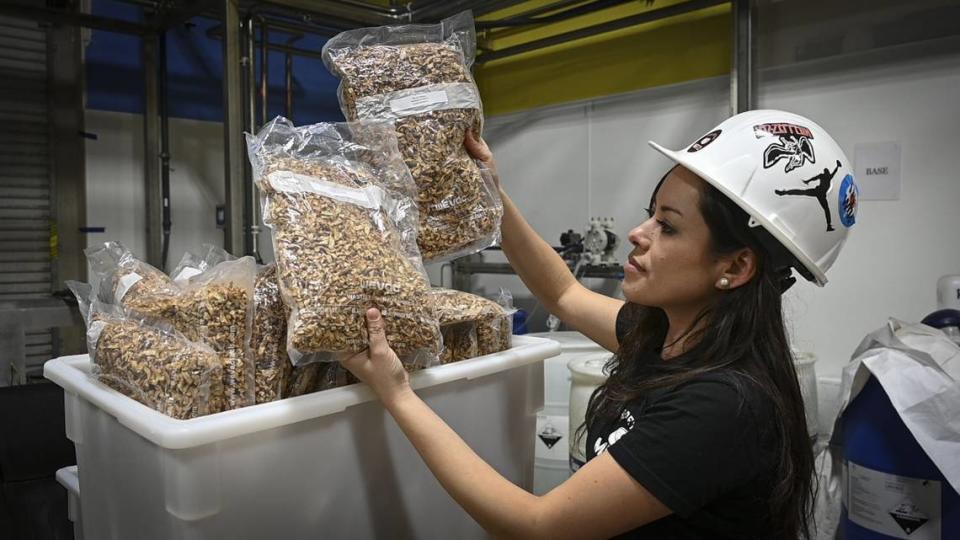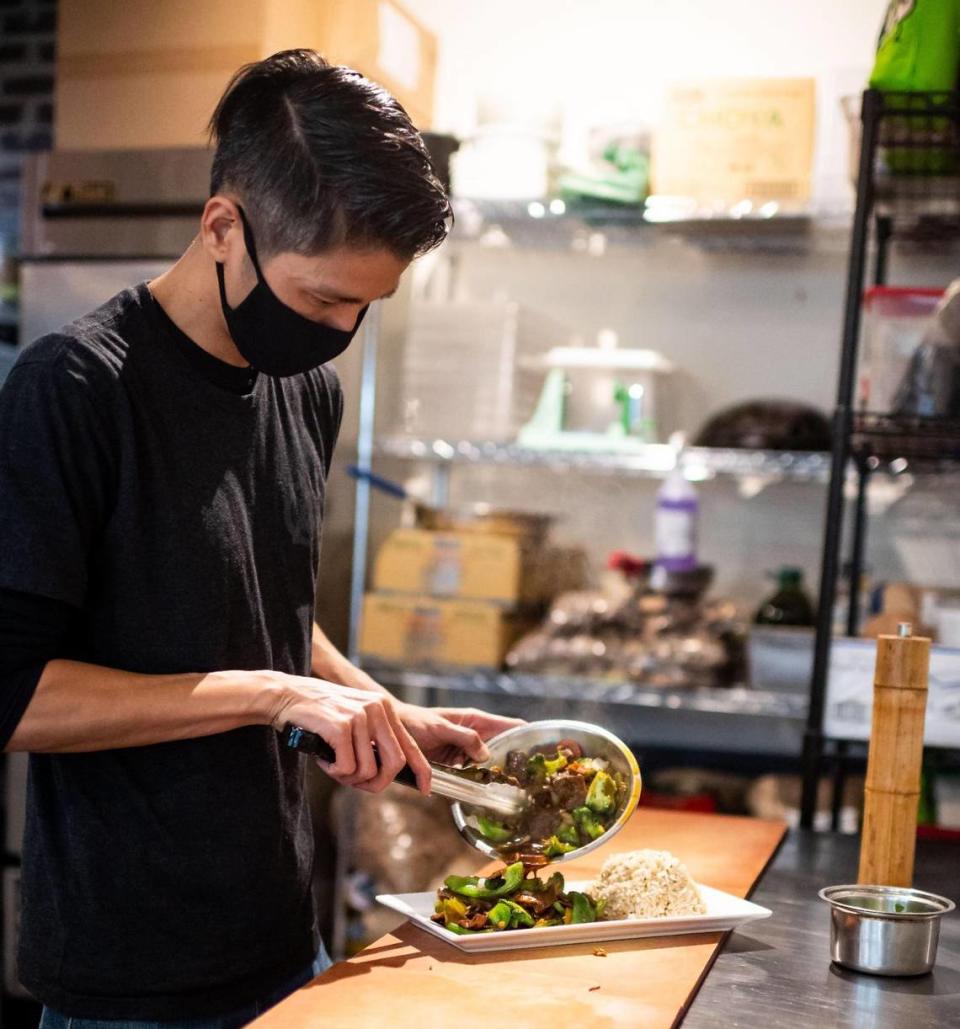Inside a plan to make greater Sacramento ‘a Silicon Valley for food tech’
A new, one-of-a-kind collaborative led by UC Davis scientists will aim to produce the meatless (or simply meat-less) burgers of the future.
UC Davis launched the Integrative Center for Alternative Meat and Protein, or iCAMP, on Wednesday morning. Here, experts can develop cutting-edge foods from cell cultures, plant-based mixtures and hybrids of real meat with other products (think filler in crab cakes).
The center will serve as a research, implementation and workforce development hub for the emerging world of alternative proteins, said iCAMP director David Block, a UC Davis chemical engineering professor and recently-departed Department of Viticulture and Enology chair.
Essentially, iCAMP wants to bring alternative meat sources to the mainstream. Though traditional meat production is tied to a slew of environmental and animal welfare issues, the worldwide demand for meat is estimated to increase 50-100% over the next 25 years as the global population swells, Block said.
Block has overseen the university’s Cultivated Meat Consortium, which grows animal products from cells in laboratories. That program will now be folded into iCAMP, the U.S.’ first federally-funded academic research center looking into cultivated meat.
iCAMP researchers will also experiment with plant-based imitation meat, similar to Beyond Meat burgers or Good Catch faux fish fillets, as well as hybrid products made from a mixture of real meat and alternatives. The center currently has more than $5 million in funding, and leaders hope to acquire more through federal grants and private partners.
“One of the things that’s really exciting is being able to think about all of these different types of products — and thinking about conventional meat — all under the same umbrella,” Block said. “Because thinking about cultivated meat in isolation or plant-based meat in isolation, I think, is not nearly as interesting or as efficient as thinking about them all at the same time.”
Research isn’t iCAMP’s only focus. There will continuing education programs for food industry professionals, and marketing plans designed to identify and increase customers’ appetite for faux meat. An iCAMP Cafe will eventually offer dishes made from UC Davis-created alternative meat products, both on campus and as a pop-up at community events.
Though iCAMP will be based out of UC Davis, the university will collaborate with UCLA, Solano County Community College and University of Maryland, Baltimore County on the endeavor as well at the USDA and Culinary Institute of America. Local alternative food start-ups such as The Better Meat Co. in West Sacramento (more on them later) will be involved as well.

Yolo County has become the region’s unofficial headquarters for emerging food technology, thanks in part to UC Davis but also a Woodland incubator and West Sacramento’s warehouses. As alternative meats become more popular and better-developed, the Sacramento region’s agricultural roots could take a techy turn, Block said.
“Thinking about this idea of regional economic development and really making this area favorable for food tech, I think you can really start to imagine this area being something like a Silicon Valley for food tech,” Block said.
What I’m Eating
Andy Nguyen’s Vegetarian Restaurant is a concept of the 2000s (and truthfully, the 20th century, though it served meat back then). Buddha Belly Burger is Nguyen’s restaurant for the 2020s.
The vegan burger bar feels more modern and seductive, a dimly-lit enclave for plant-based eaters that opened in May in midtown Sacramento. Gluten-free options abound as well, and there’s a bit of a weekend brunch program centered around different avocado toasts.
After tasting the maha mushrooms ($14.50, and also available at Andy Nguyen’s), I’m convinced that Mother has competition for the best fried ‘shrooms in town. Giant fronds of blue oyster mushrooms are tempura-battered, fried to an impeccable crackle and served with a creamy sriracha mayonnaise dipping sauce.

Several types of burgers come on squishy pretzel buns with crunchy iceberg lettuce, microgreens and a house sauce such as garlic confit mayo or “Thousand Buddha.” The lion’s mane burger ($18.75 with a side of fries, salad or charred broccoli for an additional $2) took on a nice flavor from the mushroom’s soy sauce marinade, but I preferred the bánh mì burger ($18) with its pickled carrots, sliced jalapeños and juicy Impossible Meats patty.
Buddha Belly is the only restaurant to carry a dish with Rhiza, a lab-grown, adaptable fungus from The Better Meat Co. that can be artificially colored and flavored to imitate a wide range of meats.
It appears in the Rhiza carne asada bowl ($18.75) alongside sliced okra, quinoa, roasted sweet potatoes and a garlicky chipotle dressing. That’s the right place, as the mock meat’s smoky taste shines and other deficiencies (a lighter color and chewier texture than typical asada) are disguised. Buddha Belly will eventually carry a Rhiza steak, The Better Meat Co. CEO Paul Shapiro said in an email, and I’ll be eager to taste it.
Buddha Belly Burger
Address: 1901 S St., Suite 100, Sacramento.
Hours: 11 a.m.-9 p.m. Monday through Thursday, 11 a.m.-9:30 p.m. Friday, 10 a.m.-9:30 p.m. Friday, 10 a.m.-9 p.m. Sunday.
Phone: (916) 594-7646.
Website: https://www.instagram.com/buddhabellyburger
Drinks: No alcohol, but fresh-squeezed juices and lemonade and housemade sodas are worth a try.
Vegetarian options: All options are vegan.
Noise level: Quiet.
Openings & Closings
▪ Jimboy’s Tacos opened a new location at 750 Harbor Blvd. in West Sacramento, its first in the Yolo County city. Open from 7 a.m. to midnight seven days per week, it serves the Parmesan-dusted, hard-shell ground beef tacos and other Cali-Mex specialties that have made the Folsom-based local chain a success over the past 70 years.
▪ Roti & Boti is now open at 4680 Natomas Blvd. in North Natomas’ Park Place 2 shopping center. Look for halal Indian and Pakistani dishes such as tandoori prawns or lahori chanay (a chickpea curry).
▪ Ahipoki has closed its Roseville location at 3984 Douglas Blvd., though other locations remain open in Arden Arcade and El Dorado Hills. And fear not: another poke joint, Chico-based I Fish Poke Bar, has already filled the Roseville space.
Get Sacramento's Food & Drink news delivered to your inbox
Sign up here to receive our free weekly Food & Drink newsletter, written by Bee food reporter Benjy Egel. You'll exclusively receive an early look at restaurants, bars, festivals and more.


